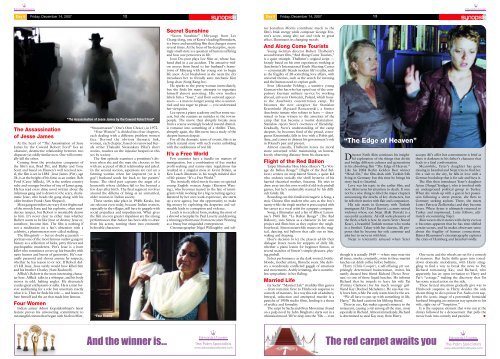Hernandez/GULF
Dubai - The Hollywood Reporter
Dubai - The Hollywood Reporter
You also want an ePaper? Increase the reach of your titles
YUMPU automatically turns print PDFs into web optimized ePapers that Google loves.
Day 6 Friday, December 14, 2007 12synopsisDay 6 Friday, December 14, 2007 13synopsisThe Assassinationof Jesse JamesAt the heart of “The Assassination of JesseJames by the Coward Robert Ford” lies anobsessive, destructive relationship between twodisparate yet oddly similar men. One will eventuallykill the other.Coming from the production companies ofthe film’s star, Brad Pitt, and Ridley and TonyScott and based on Hansen’s well received novel,the film is set in 1881. Jesse James (Pitt), age34, is at the height of his fame as an outlaw. BobFord (Casey Affleck), 19, is the restless countryrube and younger brother of one of James gang.He has read every dime novel written about theinfamous gang and is drawn to the scary, charismaticJesse, who heads the gang along with hisolder brother Frank (Sam Shepard).Most gang members are wary if not frightenedof the moody Jesse and his explosive, often murderoustemper, but Robert is irresistably drawnto him. It’s never clear to either man whetherRobert wants to be like Jesse or destroy Jesse or,somehow, become him. The film is nothing ifnot a meditation on a fan’s obsession with acelebrity, a phenomenon now called stalking.The film grimly — but no doubt accurately —portrays one of the most famous outlaw gangs inhistory as a collection of hicks, petty thieves andpsychopathic murderers. Pitt’s Jesse is a bornkiller who sometimes covers up his brutality withnasty humor and bursts of generosity. He’s naturallyparanoid and shoots anyone he suspects,whether he has reason to or not. If Robert didn’tkill Jesse, Jesse surely would have killed himand his brother Charley (Sam Rockwell).Affleck’s Robert is the most interesting characterhere. Affleck talks in a whimper, and his bodymoves in odd, halting angles. He alternatelyexudes great enthusiasm or sulks. He is a man foreverauditioning for a role but uncertain exactlywhat it is. Then he finds his role — and learns tohate himself and the act that made him famous.Four WomenIndian auteur Adoor Gopalakrishnan’s latestfeature proves his unwavering commitment tomeaningful cinema that began with his first effort,“The Assassination of Jesse James by the Coward Robert Ford”“Swayamvaram” (One’s Own Choice), in 1972.“Four Women” is divided into four chapters,each dealing with a different problem womenface. Beyond the obvious thematic link,women, each chapter, based on renowned Keralawriter Thakazhi Sivasankara Pillai’s shortstories, touches on the injustice heaped on thissex by society.The first episode examines a prostitute’s distresswhen she and the man she chooses to livewith are accused of illicit relationship and jailed.In the second section, aspersions are cast on afarming woman when her impotent (or is itgay?) husband sends her back to her parents’home. The third part captures the angst of ahousewife whose children fail to live beyond afew days after birth. The final segment revolvesaround the dillema of living as an unmarried,older woman in Indian society.These stories take place in 1940s Kerala, butare relevant even today, because Indian women,especially in the villages, still have to grapple withsocial prejudices and impediments. What givesthe film an even greater impulsion are the strongperformances that Adoor has been able to drawfrom his actors, turning them into eminentlybelievable characters“Four Rooms”Secret Sunshine“Secret Sunshine” (Miryang) from LeeChang-dong, one of Korea’s leading filmmakers,is a brave and unsettling film that changes courseseveral times. At the focus of his deceptive, seeminglysmall story is a question of human sufferingand how one perseveres in life.Jeon Do-yeon plays Lee Shin-ae, whose husbanddied in a car accident. The attractive widowmoves from Seoul to her husband’s hometownof Miryang with her young son to beginlife anew. A car breakdown as she nears the cityintroduces her to friendly auto mechanic KimJong-chan (Song Kang-ho).He sparks to the pretty woman immediately,but she finds his many attempts to ingratiatehimself almost annoying. His own motherlabels him a “loser,” and from outward appearances— a man no longer young who is unmarriedand too eager to please — you understandher viewpoint.Lee opens a piano academy and has some success,but she remains an outsider to the townspeople.The movie then abruptly breaks awayfrom a course seemingly headed toward dramaticromance into something of a thriller. Then,abruptly again, the film turns into a study of thedeepest human despair.For all the dramatic turns of events, this is anutterly natural story with such events unfoldingwith the suddenness of real lifeIt’s a Free WorldFew countries have a handle on matters ofimmigration, but a combination of free marketprofit-seeking and nanny-state regulations hasresulted in a singular mess in Great Britain, asKen Loach illustrates in his tough-minded sliceof life picture “It’s a Free World.”The ironically titled movie focuses on spiritedyoung English woman Angie (Kierston Wareing),who becomes inured to the fate of immigrantswhile working for a big recruiting agency.Battered by her own work experience, she startsup a new agency, but the opportunity to makebig money by exploiting the desperate and vulnerableleads to corruption and violence.Loach is in excellent form, making the most ofa shrewd screenplay by Paul Laverty and drawinga winning performance from newcomer Wareingas a brassy but misguided entrepreneur.Cinematographer Nigel Willoughby and edi-tor Jonathan Morris contribute much to thefilm’s brisk energy while composer George Fenton’sscore, using alto sax and viola to greateffect, illuminates its changing moodsAnd Along Come TouristsYoung German director Robert Thalheim’ssecond feature film, “And Along Come Tourists,”is a quiet triumph. Thalheim’s original script —loosely based on his own experiences working atAuschwitz’s International Youth Meeting Center— economically blends modern life’s truths, suchas the fragility of 20-something love affairs, withuniversal themes, such as the search for meaningand the human need to expiate guilt.Sven (Alexander Fehling), a sensitive youngGerman who has who has opted out of the compulsoryGerman military service by workingabroad, arrives in Oswiecim, Poland, which housesthe Auschwitz concentration camp. Hebecomes the new caregiver for StanislawKrzeminski (Ryszard Ronczewski), a formerAuschwitz inmate who refuses to leave — determinedto bear witness to the atrocities of thecamp that has become a tourist destination.Stanislaw rejects Sven’s overtures of friendship.Gradually, Sven’s understanding of the campdeepens, he becomes fond of the proud, courageousKrzeminski, falls in love with a Polish girl,Ania, and comes to distrust his government’s rolein Poland’s past and present.Almost casually, Thalheim leaves no moralstone unturned while maintaining an honest,keenly observing distance from his characters.Flight of the Red BallonTaipei filmmaker Hou Hsiao Hsien’s “Le Voyagedu Ballon Rouge” (Flight of the Red Balloon)centers on mop-haired Simon, a quiet kidwho endures stoically the shrill hysterics of hisharried theatrical mother, Suzanne. He tries todraw away into his own world of old-style pinballgames, but he’s undeniably stunted by his difficultfamily life.Rounding out this familial menagerie is Song, astoic Chinese film student who acts as the boy’snanny while the single mother is preoccupied withher career as a vocal artist for a puppet company.Song, a filmmaker and a fan of Albert Lamorisse’s1965 film “Le Ballon Rouge” (The RedBalloon), uses Simon as a character in her ownproject and films him as they explore the neighbourhood.Simon meanwhile muses on the magical,dancing red balloon that calls out to him,waking and sleeping.Hou’s decision to let the players ad-lib theirdialogue leaves room for snippets of daily life,whether a piano lesson for beginner Simon, orseveral snatches of Simon’s simple pleasure, playingpinball.In her performance as the dark-rooted, bottleblonde,mother artiste, Binoche soars. She deliversa wondrously conflicted gaggle of emotionsand movements. Archly irritating, she is nonethelesssympathetic in her flailing.Married LifeIra Sachs’ “Married Life” straddles film genres— from romantic farce to Hitchcock suspense tocomedy of manners. In a way this tale of adultery,betrayal, seduction and attempted murder is apastiche of 1950s studio films, lending it a sheenof artifice and formality.The script by Sachs and Oren Moverman (basedon a pulp novel by John Bingham) starts out in awhimsical mood. We’re deep into the ’50s — even“The Edge of Heaven”Director Fatih Akin continues his insightfulexploration of the things that divideand bridge different cultures and generationsin his absorbing film “The Edge of Heaven.”Like his 2004 Berlin Golden Bear winner“Head-On,” the film deals with Turkish folkliving in Germany but this time he brings hisstory back to Istanbul.Love was his topic in the earlier film, andnow Akin turns his attention to death. It maynot be a wise thing to label the major chaptersannouncing the deaths of key characters, buthe tells their stories with flair and compassion.His tale starts in Germany with Turkishimmigrant Ali (Tuncel Kurtiz), a crusty retiredwidower whose son Nejat (Baki Davrak) is asuccessful academic. Ali still seeks pleasures ofthe flesh, which is how he meets Yeter (NurselKose), a beautiful Turkish woman who worksin a brothel. Taken with her charms, Ali proposesthat he become her sole customer andasks her to move in with him.Nejat is tolerantly amused when Yeterthough it is actually 1949 — where men wear tiesall times, smoke constantly, swim in three-martinilunches yet drink coffee before bedtime.Harry (Chris Cooper), a self-effacing yet surprisinglydetermined businessman, invites hisnattily dressed best friend Richard (Pierce Brosnan)to one of those liquid lunches. He informsRichard that he intends to leave his wife Pat(Patricia Clarkson) for his much younger girlfriendKay (Rachael McAdams). He says Kay trulyloves him, while Pat only wants him for the sex.“We all have to put up with something in life,Harry,” Richard cautions his lifelong friend.Then on cue, Kay makes a grand entrance to therestaurant, causing a stir among all the men, mostespecially in Richard. Almost immediately, Richardis determined to steal Kay away from Harry.accepts Ali’s offer but contentment is brief asthere is darkness in his father’s character thatleads to a fatal confrontation.Meanwhile, Yeter’s daughter has gonemissing in Istanbul and Nejat tries to find her.On a visit to the city, he falls in love with aGerman bookshop that is for sale and buys it.The film then introduces Yeter’s daughterAyten (Nurgel Yesilgay), who is involved withan underground political group in Turkey.When she winds up with a gun in her possessionfollowing a street protest, she flees toGermany seeking asylum. There, she meetsLotte (Patrycia Ziolkowska) and they becomelovers. When Ayten is ultimately returned toTurkey and imprisoned, Lotte follows, ultimatelyencountering Najet.Akin weaves their stories with clarity even asit becomes apparent that he has time-shiftedcertain scenes, and he makes observant senseabout the fragility of human connections.Rainer Klausmann’s cinematography capturesthe cities of Hamburg and Istanbul vividly.One scene and the wheels are set for a comedyof manners. But Sachs shifts gears into toneddowndomestic melodrama, with Harry strugglingto find a way to break the news to Pat;Richard romancing Kay; and Richard, whoapparently has an open invitation to Harry andPat’s “cottage,” making the discovery that Pathas some sexual action on the side.These farcical situations gradually give way toHitchcock suspense as Harry decides the onlydecent thing to do is poison Pat. Sachs even suppliesthe iconic image of a potentially homicidalhusband bringing an ominous tray upstairs to hiswife, right out of “Suspicion.”It is the suspense element that wins out at theclimax followed by a denouement that pulls themovie back into comedy and pastiche. •










